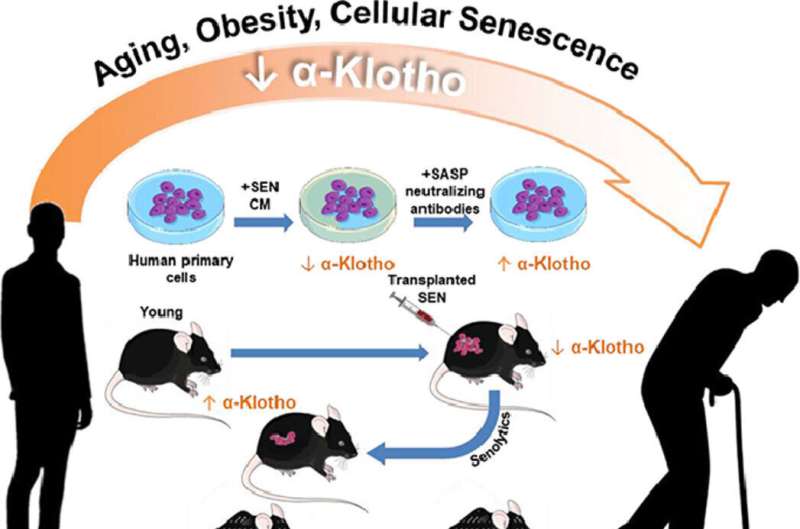Senolytic drugs can boost key protective protein against certain diseases and aspects of aging

Mayo Clinic researchers say senolytic drugs can boost a key protein in the body that protects older people against aspects of aging and a range of diseases. Their findings, which are published in eBioMedicine, demonstrate this in mice and human studies.
Senolytics developed at Mayo Clinic and given once clear the bloodstream of senescent or "zombie" cells. These cells contribute to multiple diseases and negative aspects of aging. This study shows that the removal of senescent cells significantly boosts the production of a protective protein called α-Klotho.
"We show that there is an avenue for an orally active, small-molecule approach to increase this beneficial protein and also to amplify the action of senolytic drugs," says James Kirkland, M.D., Ph.D., a Mayo Clinic internist and senior author of the study.
The researchers first showed that senescent cells decrease levels of α-Klotho in three types of human cells: umbilical vein endothelial cells, kidney cells and brain cells. They also demonstrated through using the senolytics desatinib plus quercitin in three types of mice that α-Klotho was increased. They also showed that after administering desatinib plus quercitin in clinical trial participants with idiopathic pulmonary fibrosis, α-Klotho also increased.
"We also are first to link the potential impact of fat-resident senescent cells on brain α-Klotho," says Yi Zhu, Ph.D., a Mayo Clinic physiologist and biomedical engineer, and first author of the study. "This may open another avenue to investigate the impact of peripheral senescent cells on brain aging."
The protein α-Klotho is important to maintaining good health, as it tends to decrease with age, and especially decreases in multiple diseases, including Alzheimer's, diabetes and kidney disease. Animal studies have shown that decreasing α-Klotho in mice shortens life span and increasing α-Klotho in mice by inserting a gene that causes its production increases life span by 30%.
Discovering ways to increase α-Klotho in humans has been a major research goal, but that has been difficult because of its size and instability. Introducing it directly is problematic, as it would have to be administered into a vein instead of by mouth.
This study shows that senolytics, which can be administered orally, increase α-Klotho in humans with idiopathic pulmonary fibrosis, a senescence-associated disease that leads to frailty, serious breathing difficulties and death.
More information: Yi Zhu et al, Orally-active, clinically-translatable senolytics restore α-Klotho in mice and humans, eBioMedicine (2022). DOI: 10.1016/j.ebiom.2022.103912

















